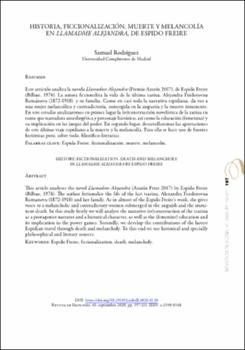Historia, ficcionalización, muerte y melancolía en Llamadme Alejandra, de Espido Freire
Author
Rodríguez, SamuelDate
2020Abstract
Este artículo analiza la novela Llamadme Alejandra (Premio Azorín 2017), de Espido Freire
(Bilbao, 1974). La autora ficcionaliza la vida de la última zarina, Alejandra Fiódorovna
Románova (1872-1918), y su familia. Como en casi toda la narrativa espidiana, da voz a
una mujer melancólica y contradictoria, sumergida en la angustia y la muerte inminente.
En este estudio analizaremos en primer lugar la (re)construcción novelística de la zarina en
tanto que narradora autodiegética y personaje histórico, así como la educación (femenina) y
su implicación en los juegos del poder. En segundo lugar, desarrollaremos las aportaciones
de este último viaje espidiano a la muerte y la melancolía. Para ello se hace uso de fuentes
históricas pero, sobre todo, filosófico-literarias. This article analyses the novel Llamadme Alejandra (Azorín Prize 2017) by Espido Freire
(Bilbao, 1974). The author fictionalise the life of the last tsarina, Alexandra Feodorovna
Romanova (1872-1918) and her family. As in almost of the Espido Freire’s work, she gives
voice to a melancholic and contradictory women submerged in the anguish and the immi-
nent death. In this study firstly we will analyse the narrative (re)construction of the tsarina
as a protagonist narrator and a historical character, as well as the (femenine) education and
its implication in the power games. Secondly, we develop the contributions of the lastest
Espidian travel through death and melancholy. To this end we use historical and specially
philosophical and literary sources.





